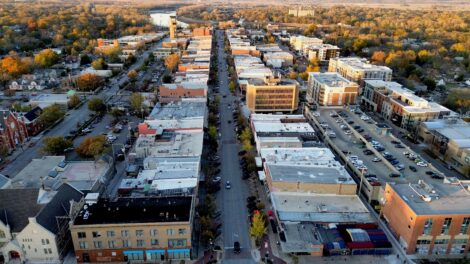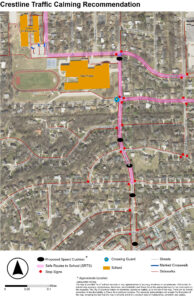Residents come together to brainstorm ideas to create more affordable housing in Douglas County

photo by: Dylan Lysen
Christina Gentry, a community liaison for the Lawrence-Douglas County Health Department, recounts her family's struggles to find affordable housing when they moved to Lawrence during a community meeting on the subject Wednesday, April 24, 2019.
When Christina Gentry first moved to Lawrence with her husband and four children, she began a long road of homelessness, she said Wednesday during a community meeting focusing on affordable housing.
After plans to move into a five-bedroom home fell through, Gentry and her family were forced to live out of a motel and eventually a camper. But the housing complication came with more serious consequences when she did not receive important mail related to a court date, which led to her arrest for failure to appear. She spent a week in jail before she could bond out, she said.
The episode led to the end of Gentry’s marriage and other family problems, which exacerbated the struggle to find permanent housing in Lawrence.
“That was the lowest time of my life,” Gentry said.
Gentry, who is a community liaison for the Lawrence-Douglas County Health Department, shared her story during a public meeting on affordable housing hosted by the Douglas County Community Foundation at the Lawrence Public Library on Wednesday. The event, Community Convening on Affordable Housing, was the first in a series of three public meetings to discuss local concerns that the foundation hopes to help address.
Gentry said she and her children were eventually able to find affordable housing in Lawrence because of the help from Lawrence Family Promise, a local nonprofit organization that aims to help homeless families obtain affordable, permanent housing. Despite the challenges, Gentry said all of her children are now doing well in high school and college.
“My hope today is that my experience plants a seed of the importance to give families an opportunity to create roots for stability that comes when housing is more affordable,” she said.
Along with Gentry, several local experts on homelessness and affordable housing shared ideas on how to address an issue that has become a concern in Lawrence. The panel included Ron Gaches, chair of the City of Lawrence’s affordable housing advisory board, as well as representatives from KU, Bert Nash Community Mental Health Center, the Lawrence Home Builders Association and other local organizations.
Last year, the City of Lawrence hired BBC Research & Consulting to complete a housing market analysis that found about 5,300 Lawrence renters were cost-burdened, defined as those who spend more than 30% of their income on rent and utilities. The study also found that about 2,300 renters earning between about $35,000 and $75,000 would like to purchase a home, but few affordable homes are available.
While all of the panelists gave different ideas to address those issues, they all shared a theme of the community and local groups working together to find solutions.
Additionally, Lt. Gov. Lynn Rogers attended the meeting and explained to the audience that affordable housing is a large part of the state’s focus on rebuilding rural communities, which have seen significant population declines in recent years.

photo by: Dylan Lysen
Kansas Lt. Gov. Lynn Rogers speaks to an audience during a community discussion on affordable housing at the Lawrence Public Library on Wednesday, April 24, 2019.
Rogers said some ideas include renovating buildings in rural downtown areas for affordable housing, which can have the added benefit of finding purposes for vacant buildings and putting people closer to commerce areas to help stimulate economies in those rural communities.
The panel of experts took a few written questions from the audience. One question raised was how the community might deal with the concerns of groups that do not want to allow affordable housing projects, sometimes known as “not in my backyard,” or NIMBY groups.
Gaches said the issue of affordable housing should not be forced upon any one neighborhood, but that every neighborhood should be involved, which would help to spread the burden and make initiatives more effective.
“I think we are going to overcome the NIMBY issues,” he said. “All communities should be expected to participate in the solutions.”
After the panel took questions, the audience broke up into brainstorming groups along with the experts to share ideas of their own. Chip Blaser, the executive director of DCCF, said the ideas and other information gathered in the sessions will be shared publicly at a later date.
Contact Dylan Lysen
Have a story idea, news or information to share? Contact University of Kansas, higher education, state government reporter Dylan Lysen:
- • dlysen@ljworld.com
- • 785-832-6353
- • Twitter: @DylanLysen
- • Read other stories by Dylan






